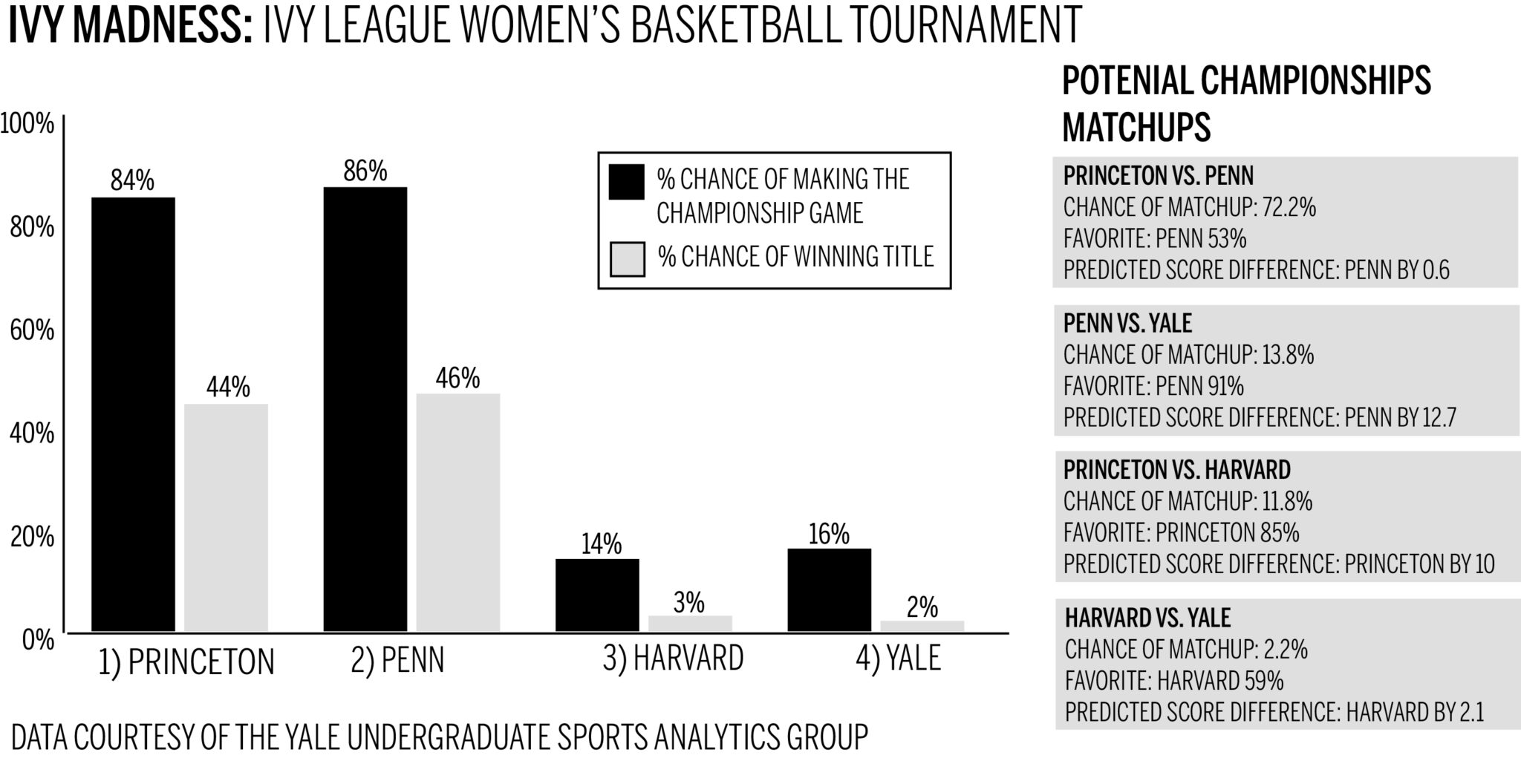

Just a month ago, there was a realistic chance that neither the Yale men’s nor women’s basketball team would finish in the top half of the conference standings and earn a ticket to the Ivy League Tournament. The men sat at 2–4 after a tough conference sweep, while the women were locked in a three-way tie for the final playoff spot with Dartmouth and Harvard.
Yet after winning seven of its final eight games, the men’s team finds itself in a familiar position, finishing in the top half of the Ancient Eight standings for the 18th straight season, while the women’s team sneaks into the tournament field with just a single game cushion over fifth place and looking to pull a few upsets.
As the third-place finisher, the Yale men’s team has the misfortune of playing No. 2-seeded Penn in Philadelphia. According to my model, the Quakers are a nine-point favorite, giving the Bulldogs just a 16 percent chance to reach the championship game. Across college basketball, home-court advantage is worth roughly 3.5 points, so the fact that the Yale-Penn semifinal is not on a neutral court decreases Yale’s chances of reaching the finals by neary 11 percent.
Since Penn is not the top seed, that advantage seems somewhat undeserved, but Yale will have to play with the hand it has been dealt. In past years, the Ancient Eight did not host a tournament to decide its automatic bid to the NCAA tournament, and as such, Yale would have been eliminated from title contention over a month ago.
While the numbers might not like Yale’s chances, the Bulldogs match up better against the Quakers than they do with No. 1-seeded Crimson. For starters, the Elis toppled Penn at home this past weekend in a thrilling comeback win, and there is no reason to think that they cannot use that same blueprint to repeat the upset. In the first Yale-Penn matchup in Philadelphia, the Bulldogs fell 59–50 in the second game of a back-to-back while shooting just 1–19 from beyond the arc. Even with a dismal 4–17 showing from three last Friday, the Elis found a way to beat the Quakers, so if they can shoot anywhere near their season average of 33.7 percent, they will be in a good position to win.
Should the Bulldogs win on Saturday, they would face either Harvard or Cornell. The Crimson are favored over Cornell by 6.6 points, with a win probability of 77 percent. Regardless of Yale’s opponent, any title game featuring the Bulldogs is projected to be extremely close. The Elis would be favored by roughly three points against Cornell and would be just four point underdogs against their archrivals from Cambridge. Either way, the numbers suggest getting to the title game will be more challenging for Yale than winning it should it get there. Overall, the Bulldogs have roughly a seven percent chance of reaching the NCAA Tournament.
Unlike the men’s side of Ivy Madness, in which there is a great deal of parity, the women’s tournament heavily favors the top two seeds in Penn and Princeton. The Bulldogs will face a tall task when they face No. 1-seeded Princeton. Interestingly, Yale faces 16 percent odds to reach the final, exactly the same chance as the men’s team. But while the chances of an upset may be nearly identical as their male counterparts, there are perhaps fewer reasons to suggest the Yale women’s odds should be any higher.
Unlike the men’s team, the women’s team limps into the Ivy League tournament after suffering double-digit loses last weekend at the hands of both Penn and Princeton. Furthermore, the Ivy League takes measures to mitigate Penn’s home-court advantage, such as awarding the home locker room to the top seed, so the 16 percent odds given to the Yale men, which assume full home-court advantage for Penn, may represent an underestimate.
The women have already beaten Princeton once, showing that the improbable is not the impossible. They will have to match their performance from Feb. 2 to have a chance against a Princeton team that dropped just one other game in Ivy play this year.
The most likely, and perhaps most exciting potential championship game would be a rematch of last year’s final between Penn and Princeton. This rematch, which has about a 72 percent likelihood of happening, is projected to be decided by less than a point, and pits the league’s two best teams against one another for all the marbles.
While any other matchup would feature compelling storylines, none is projected to be as close as the battle of “the Ps.” Should Yale manage to sneak past the Tigers, Bulldog fans should be pulling for Harvard in the second semifinal. Yale is 4.5 times as likely to beat the Crimson as it is to beat Penn, and only once all season has a team managed to beat Princeton and Penn on back-to-back days.
While the Palestra — the “Cathedral of College Basketball” — will undoubtedly make a great host for Ivy Madness, it comes with a cost. Under the assumption that home-court advantage is in full effect, both the Penn men’s and women’s teams are 12 percent more likely to win the tournament than if it were hosted at a neutral site, and 25 percent more likely to win the tournament than if it were hosted on the campus of the top seed.
Neither No. 1 seed — the Harvard men nor the Princeton women — enters the tournament as favorites simply due to the home-court advantage gifted to the Quakers. Even with a giant Ivy League logo covering the usual Penn P in the middle of the gym, let’s just hope this Ivy Madness allows two teams — and not the court — to be remembered in the record books forever.
Luke Benz is the President of the Yale Undergraduate Sports Analytics Group. Contact Luke Benz at luke.benz@yale.edu .







